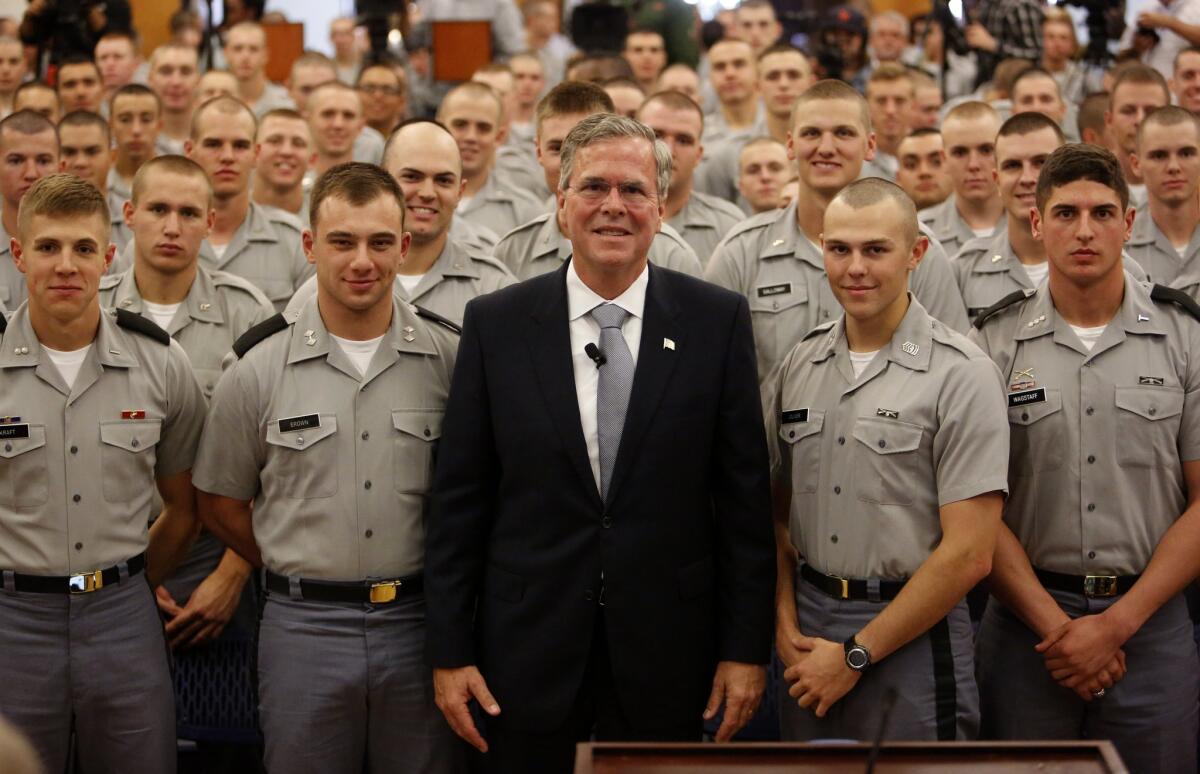Jeb Bush: U.S. must increase force on ground in Mideast to combat Islamic State

Republican presidential candidate, former Florida Gov. Jeb Bush, poses with cadets after giving a speech on foreign policy and national defense on the campus of The Citadel, Wednesday, Nov. 18, 2015, in Charleston, S.C.
- Share via
Reporting from Washington — The U.S. “will need to increase our presence on the ground” in the Middle East to combat Islamic State, Jeb Bush said Wednesday, crossing a line that several of his rivals for the Republican presidential nomination have so far sidestepped.
In a speech that his campaign billed as a major address on military policy, the one-time Republican front-runner did not specify how many troops he would send or whether he would have them engage in direct combat against Islamic State.
“The bulk of these ground troops will need to come from local forces that we have built workable relationships with,” said Bush, the former governor of Florida.
Attacks in Paris: Europe’s worst terrorist attack in more than decade >>
But the U.S. “should not delay in leading a global coalition to take out ISIS with overwhelming force,” he said, using an acronym for Islamic State. And “while air power is essential, it alone cannot bring the results we seek.”
The Obama administration has dispatched several thousand U.S. troops to Iraq to train Iraqi forces and help direct airstrikes. And late last month, the administration announced that it would send special operations forces to Syria.
But President Obama has resisted a direct combat role for U.S. troops. Iraqi and Syrian forces need to take primary responsibility for recapturing territory that Islamic State has seized in those two countries, he has said.
How much Bush’s plan would differ from the administration’s in practice remains uncertain because the candidate has not specified what sort of force he has in mind.
“The scope ... should be in line with what our military generals, not politicians, recommend will be necessary,” he said in his speech, delivered at the Citadel military college in South Carolina.
Though his plan lacked details, Bush clearly set up a contrast in language with Obama.
“Radical Islamic terrorists have declared war on the western world,” he said. “Their aim is our total destruction. We can’t withdraw from this threat or negotiate with it. We have but one choice: to defeat it.”
Bush did agree with Obama on one key point, regarding Syrian President Bashar Assad.
“To take out ISIS, we must end Assad’s brutal war against his own people and create a political solution that allows for a stable Syria,” he said. Obama said Monday that a political settlement in Syria was a necessary step toward defeating Islamic State.
Ending the Syrian civil war, now in its fifth year, has so far stymied diplomats from the U.S. and other nations.
Russia and Iran back Assad and say that the U.S. and its European allies should join forces with the Syrian leader to defeat Islamic State. On the other side, Turkey, Saudi Arabia and other predominantly Sunni Arab countries say Assad must leave power and have made the fight against him a higher priority than efforts against Islamic State, which is a Sunni militant group.
In keeping with the overall Republican critique of Obama for being too passive in the face of international crises, Bush called for a more active U.S. role.
“We don’t need to be the world’s policemen, but we must restore our place as the leader and indispensable power of the free world,” he said, calling for expanding the size of the active-duty Army and Marine Corps and for accelerating the Pentagon’s purchase of new ships and planes.
TRAIL GUIDE: All the latest news on the 2016 presidential campaign >>
He also said he would restore the National Security Agency’s controversial program, begun by his brother’s administration after the Sept. 11 attacks, to stockpile information about telephone calls made in the United States.
Under legislation passed by Congress this year, the NSA is scheduled to stop its bulk collection of such phone data after Nov. 29. Bush said that if elected, he would seek to restart it “to ensure we have the ability to connect the dots between known foreign terrorists and potential operatives here in the United States.”
For more on politics and policy, follow @DavidLauter
ALSO
Many Syrians fleeing war find they are unwelcome in U.S.
How the U.S. screens Syrian refugees to vet out potential terrorists
French investigators race to identify two killed, 8 detained in raid north of Paris
More to Read
Get the L.A. Times Politics newsletter
Deeply reported insights into legislation, politics and policy from Sacramento, Washington and beyond. In your inbox twice per week.
You may occasionally receive promotional content from the Los Angeles Times.








